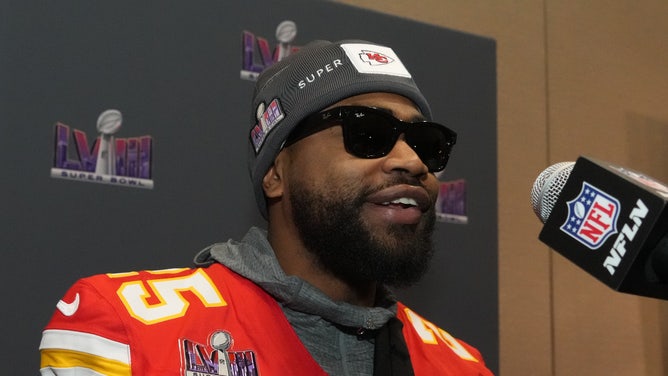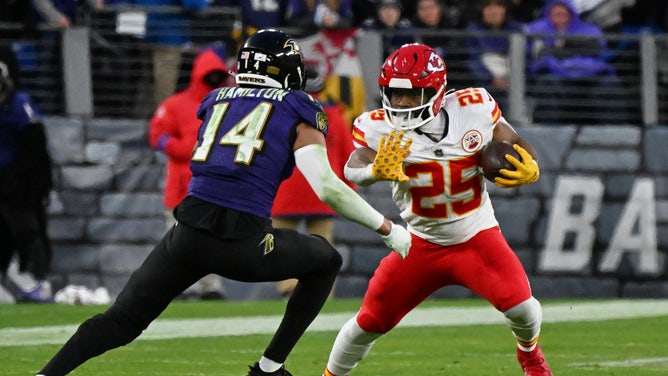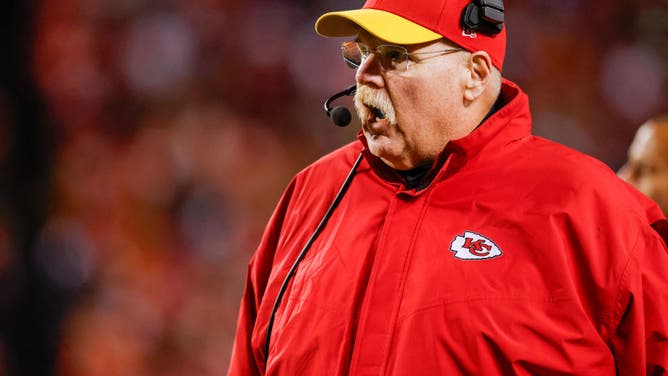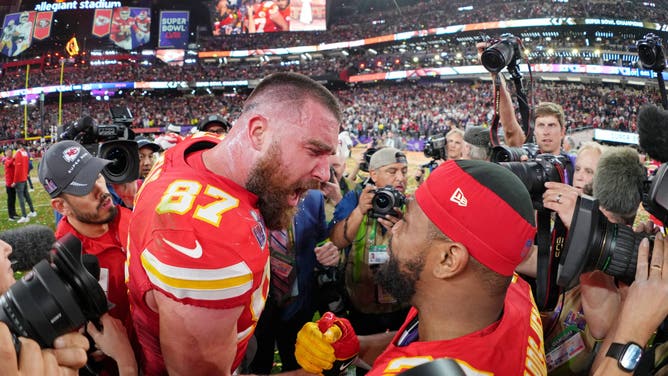Clyde Edwards-Helaire Shares PTSD Struggles Brought On By Violent Episodes He Experienced As A Teenager
That terrible day is etched in Clyde Edwards-Helaire's mind: December 22, 2018.
It's the day he either took the life of a would-be robber or witnessed his best friend do it while sitting mere inches away – the exact details of which are all still unclear based on reports at the time.
"My best friend and I had a self-defense situation and I would say that probably is the majority of where things stem from, but I wouldn't say everything stems from that," Edwards-Helaire admitted to reporters this week.

Kansas City Chiefs running back Clyde Edwards-Helaire during a press conference before Super Bowl LVIII at Westin Lake Las Vegas Resort and Spa on Feb. 7, 2024. Photo: Kirby Lee-USA TODAY Sports
Edwards-Helaire's Onset Of PTSD
"That," was the "justifiable" shooting that resulted in the death of then 18-year-old Kobe Johnson in Baton Rouge. Edwards-Helaire and Jared Small, then LSU teammates, were trying to sell Johnson some electronic equipment.
Something went horribly wrong and, well, the memory obviously haunts Edwards-Helaire. He has missed perhaps a handful of practices over his four-year career with what the Kansas City Chiefs call an "illness."
After missing a practice earlier this week with that unspecified illness, the 24-year-old running back decided it was time to be transparent and admit he suffers from Post Traumatic Stress Disorder.
"I have PTSD and cyclic vomiting syndrome," Edwards-Helaire said this week. "So it’s something that’s kind of neurological that they just help me with and walk through it and I mean I’ve – sometimes I’m admitted into the hospital – something like can’t stop throwing up, and it’s just I can’t do nothing pretty much to stop it," Edwards-Helaire said.

BALTIMORE - Kansas City Chiefs running back Clyde Edwards-Helaire (25) runs with the ball against Baltimore Ravens safety Kyle Hamilton (14) during the second half in the AFC Championship football game at M&T Bank Stadium on Jan. 28, 2024. Photo: Tommy Gilligan-USA TODAY Sports
Violence Affected Edwards-Helaire
This is an example of how much happens behind the scenes of an NFL team that the public, which typically only cares if a player is suited up or not on game day, has zero clue about.
It's also a case study in how some people in our country see and experience stuff, even early in life, that is typically reserved for soldiers on a battlefield or first responders in multiple professions.
"I have best friends that passed away at young ages from gun violence," Edwards-Helaire said. "It's not being at the right places at the right time. Just knowing I have people close to me or around me who could be in the same spot as I am.
"When I go back home, I'm visiting some of my friends who are at grave sites."
So being a football player for Edwards-Helaire is, as he says, "so much more than just putting the pads on."

Head coach Andy Reid of the Kansas City Chiefs. (Photo by David Eulitt/Getty Images)
Helaire Has A Support System
The Chiefs are obviously aware of Edwards-Helaire's condition.
"It’s real, first of all," coach Andy Reid said. "He’s admitted it which is – that’s a positive. He knows, and he’s willing to attack it. We’ve got help here for him with (Vice President of Player Services and Assessment) Dr. (Shaun) T (Tyrance), who spends time with him.
"Just keeping us informed, he does a great job with that, and then if he needs spotting, we spot him. We take that – we’re not firing through things, we get it. It’s a serious deal, so I’m just glad that he’s on board with that part. He’s been great with it."
The Chiefs have responded in that teammates such as Travis Kelce, Kadarius Toney and others monitor Edwards-Helaire to make sure his mood seems right.

PARADISE, Nevada: Kansas City Chiefs tight end Travis Kelce (87) celebrates with running back Clyde Edwards-Helaire after winning Super Bowl LVIII against the San Francisco 49ers at Allegiant Stadium on Feb. 11, 2024. Photo: Kirby Lee-USA TODAY Sports
Chiefs' Staff And Teammates Help
And then there's the professional help.
"The only person who kind of put me in the right direction was (Assistant Athletic Trainer) Julie Frymyer early on," Edwards-Helaire said. "To get me some of the meds at the time when I am probably going through an episode to get me over that hump.
"But it’s real, real bad. Dehydration, dropping rate really fast, but it’s really just mentally just not being there. And it’s one of those things where early on, guys who kind of pay attention, (Kelce), (Toney) at times, they’ll know ahead of time like, ‘OK, Clyde might not be – he’s not laughing, he’s not giggling, he’s not himself.' "
Edwards-Helaire has advice for people who may have friends or loved-ones that are suffering from PTSD.
"Dealing with PTSD, seek help when possible," he said. "But don't make it a burden on the person dealing with PTSD. Take little steps. Walk them through certain things. Don't be overwhelming.
"And then try to not bring up the trauma as much as possible."
That's interesting because Edwards-Helaire is advising not to bring up the trauma but is publicly facing his. Why?
"I feel like being a football player and kind of being a stand-up guy and guy who is looked up to, it was at least my job to kind of step up and talk about the things that some people feel vulnerable not to talk about," he said.